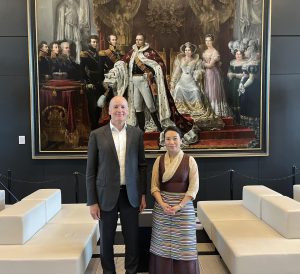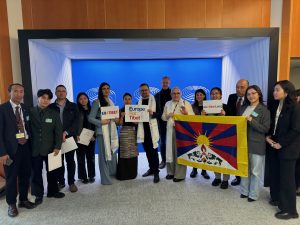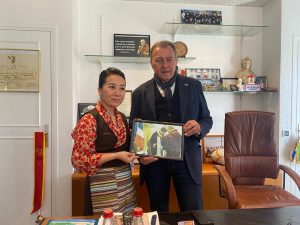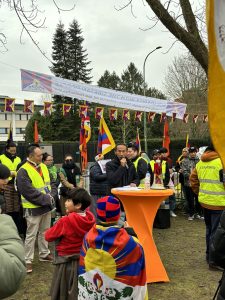October 22, 2015
Brussels, 22 October 2015: Tenzin Delek Rinpoche’s nephew today called for the immediate investigation into the death of his uncle in Chinese prison during his testimony before the Human Rights Subcommittee of the European Parliament hearing on human rights situation in Tibet.
Tenzin Delek Rinpoche died under mysterious circumstances in Chuandong prison near Chengdu city on 12 July 2015. His family alleged that he was intentionally or by negligence murdered in prison.
Lobsang Tsering, who was raised by Tenzin Delek Rinpoche, said his uncle “was sentenced to life imprisonment for a crime he never committed.” He was in extremely poor health in prison and was denied medical attention. He continued to deny the alleged charges against him until his death.
Tenzin Delek Rinpoche was a prominent Tibetan political prisoner and respected spiritual figure. He devoted his life to help his community to preserve Tibetan Buddhist culture, language and environment, especially amongst the rural poor.
“My uncle was persecuted for his support for His Holiness the Dalai Lama,” said Lobsang Tsering.
After spending five years studying Tibetan Buddhism in India, he returned to his native region Lithang in Eastern Tibet in 1987. On his return, he built seven monasteries and oversaw the construction of an old-age home, medical clinics and schools for orphans and children from poor families.
“My uncle was an advocate for the social, cultural, economic, and religious rights of local residents. He challenged deforestation projects at the expense of local communities,” Lobsang Tsering said.
The local Chinese authorities detested Tibetans’ reverence towards Tenzin Delek Rinpoche.
The Chinese authorities arrested him and his attendant Lobsang Dhondup on 7 April 2002. They were accused of allegedly being involved in a bomb blast in Chengdu city. Tenzin Delek Rinpoche was held incommunicado for eight months.
Lobsang Dhondup was executed on January 23, 2003 and Rinpoche’s sentence was commuted to life imprisonment on January 24, 2005.
“On behalf of my grateful family, I wish to thank the European Parliament for your concern and support,” said Lobsang Tsering during his testimony.
The Parliament had passed several resolutions expressing its concern for Tenzin Delek Rinpoche’s arrest, his state of health and called on Chinese authorities for his release.
The Chinese prison officials cremated his body on July 16 against the wishes of Tenzin Delek Rinpoche’s family and students. The cremated remains were thrown into the nearby river depriving his family the proper Buddhist funeral rites.
Following Tenzin Delek Rinpoche’s death, his sister and niece were detained for nearly 15 days without charge and were later released. Today, they continue to live under close scrutiny of Chinese authorities.
Lobsang Tsering said the mysterious death of his uncle in Chinese prison throws a spotlight on the torture and horrific conditions that Tibetan political prisoners face when detained by Chinese authorities.
“Tibetans are arrested for peaceful acts such as calling for the return of the Dalai Lama,” he said. “There is no freedom of movement for Tibetans, and criminalises peaceful protesters, their families and at times entire villages.”
On behalf of his family, Lobsang Tsering urged the European Parliament to call for the immediate investigation to determine whether Tenzin Delek Rinpoche and other Tibetans who died in Chinese prisons were intentionally or by negligence.
He called for religious freedom in Tibet and Tibetan language is made the medium of instruction in school instead of Chinese, and halt to the forcefully settled resettlement of Tibetan nomads and herders.
Lobsang Tsering called for the immediate resumption of dialogue with the Government of China and the Representatives of His Holiness the Dalai Lama.
– Office of Tibet, Brussels –






